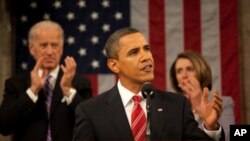President Barack Obama used his first State of the Union Address on Wednesday to try to regain political momentum for his domestic policy agenda, especially in the areas of economic recovery and job creation. Political experts say it was a strategic move Mr. Obama had to make, but they add that it is too early to know how effective the shift will be.
It has been a politically rocky first year for President Obama. The domestic political debate over health care and stimulating the economy has been costly.
Public opinion polls show diminishing support for the president's health care reform plan and growing anger over government spending adding to the federal budget deficit.
The recent victory by Republican Scott Brown in the special Senate election in Massachusetts has forced Mr. Obama and his Democratic allies in Congress to temporarily set the health care reform plan aside, while they consider a new strategy for congressional passage.
The president acknowledged some of the political difficulties of his first year during his State of the Union Address. "I campaigned on the promise of change -- change we can believe in, the slogan went. And right now, I know there are many Americans who are not sure if they still believe we can change or that I can deliver it. But remember this, I never suggested that change would be easy or that I could do it alone," he said.
Part of Mr. Obama's speech included an invitation to opposition Republicans to work with Democrats, where possible. But early indications from Republicans have not been favorable, including the leader of Republicans in the House of Representatives, John Boehner of Ohio. "I thought that the president needed to prove to the American people that he was listening. Unfortunately, the president does not appear to have listened to what the people in Massachusetts have said, what the people in New Jersey and Virginia had to say in the elections last year," he said.
President Obama also sought to encourage dispirited Democrats in his State of the Union Address. Many liberals have become disenchanted because they say they believe the president has been too willing to compromise with Republicans on some issues. And many Democrats fear that the president has spent too much time on health care and not enough time on the public's top concern -- the economy and jobs -- crucial issues in the upcoming November congressional elections.
"I think he is reaching out to working families and a lot of independents about jobs. And President Obama put jobs front and center. He said this is where we have to focus our attention -- on the economy -- and he got rousing applause for that," said Elizabeth Sherman, a political scientist at American University here in Washington.
After dominating the domestic political debate for much of the past year, health care reform will be replaced by job creation as the leading issue, says presidential historian Allan Lichtman. "Barack Obama had to make the pivot to focus on the economy. He had to convince the American people that he really cared about their plight and that he had practical, workable answers. And I think you will see his approval rating going up. And that is meaningful because the higher the approval rating of the president, the more likely he is to get things going to Congress," he said.
But in light of sustained Republican opposition to his domestic agenda, Mr. Obama's strategic pivot might lead to a less ambitious list of goals to get through Congress this year.
"So I think there will be a narrower agenda, a leaner agenda for Congress. And the president will from now on, after the State of the Union Address until the election in November, I think he will have a much more active role in actually sitting down with the Democratic majority and giving them instructions, basically leading," said Steffen Schmidt, a political scientist at Iowa State University.
Mr. Obama had hoped to recapture the sense of excitement and expectation that accompanied him into office a little more than a year ago, including his promise to change the way Washington works.
Presidents Jimmy Carter, Ronald Reagan and Bill Clinton also made similar vows and had varying degrees of success.
Lichtman says Mr. Obama has learned some important lessons in his first year as president. "Barack Obama was very naïve in believing that he could change the culture of Washington and that with a few meetings with Republicans or dinners at the houses of conservative pundits he could somehow work cooperatively with the other party," he said.
So it appears the president will press on with his domestic agenda, altered somewhat to reflect a greater focus on the economy and jobs, with somewhat less emphasis on health care reform.
Political experts say Mr. Obama might try more outreach to Republicans where he can. But they caution that Republicans might have little reason to cooperate, given surveys that show them poised to pick up seats in the November midterm congressional elections.
Obama Seeks Political Boost from State of the Union Address




